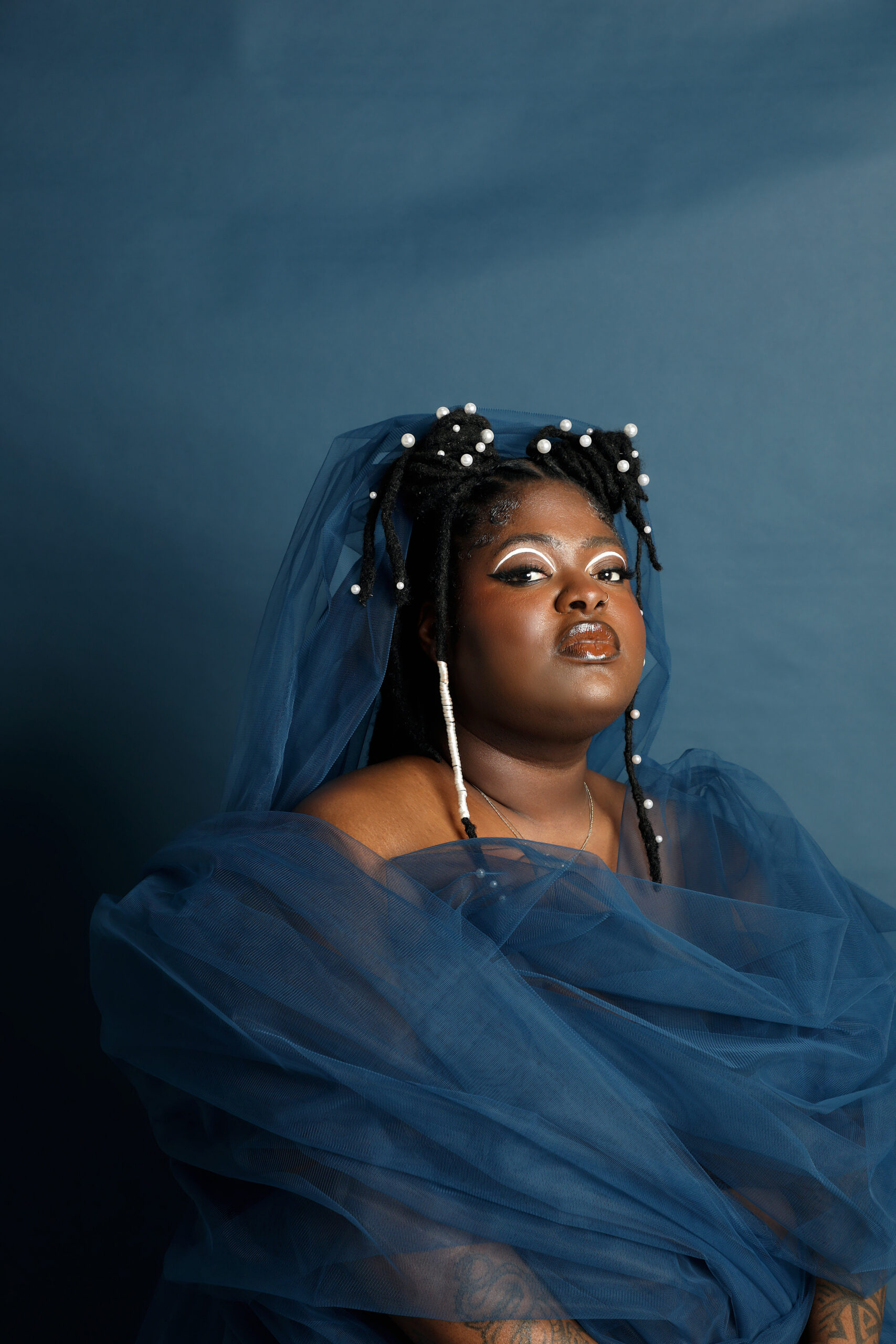Grammy-nominated rapper and Alabama native, Chika, knows firsthand what it feels like to have the internet beating down your digital doorstep. The 27-year-old briefly announced in 2021 that she was stepping back from music due to the mental toll that parasocial hatred had taken on her.
Chika — otherwise known as Jane Chika Oranika — has since doubled down on her career. Despite facing “cancelation” and being type-caste as hard and guarded, her tracks detail love, healing, and relatable angsts. Stylistically, she demonstrates immense range, with buttery vocals that easily shift from the smooth verses of a soft-spoken poet to the confident flow of a credentialed lyricist. Below, Chika reminds us that this multiplicity is not only an element of her artistry, but a reflection of her humanness.
In this relaunch of the Salty’s Cover Stars series, Chika sits down with Black, queer psychologist (and research director of the Algorithmic Bias project!), Shakira Smith, to talk about all things mental health, the internet, and radical vulnerability on the route to healing.
This interview has been edited for length and clarity.
Shakira: Let’s start with some of the themes of this cover spot. The first one being softness. This idea of vulnerability. What does that mean for you right now?
Chika: I’m actually very relieved that the theme [is softness] and that’s what we’re aiming for as a creative lens because I remember from my very first shoots and stuff, I used to say, like, “Why are they making me so hard?”
Around the time that I was doing my first-ever shoots and interviews, right before the pandemic (and some during), I was a 21-year-old going into 22, you know? I remembered they just kept giving me, like, Biggie comparisons. And I get it because I lived in New York — not in Brooklyn — but I lived in Portchester. And that’s where most people had known me.
So, all of my interviews were there. Then a lot of classic New York photographers who had photographed Biggie had looked at me and were like “Oh, it’s a similar muse.” And then also, I’m pretty outspoken. I’m dark-skinned. I’m plus-size. I’m clear.
Everyone always was like “Oh, this is the archetype of the woman she is,” and they made it out to be this very tough exterior thing. At first, I didn’t think it was a problem because I found power in existing in both my masculinity and my femininity, or my toughness and my softness. But then I realized that I was technically, essentially being typecast in a way, and kind of pigeonholed… I didn’t realize it was too late…
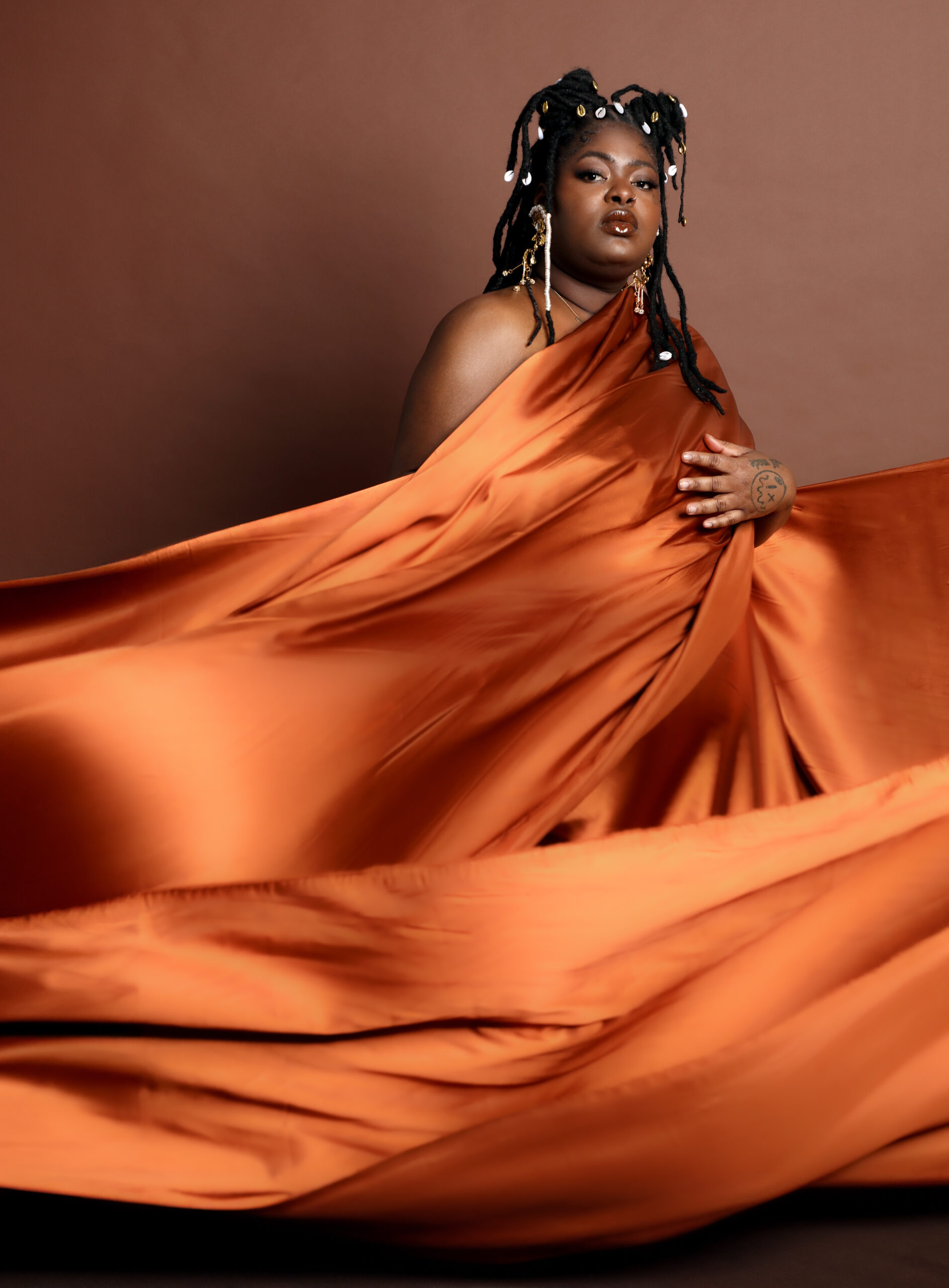 Shakira: Hindsight.
Shakira: Hindsight.
Chika: Yeah, hindsight is definitely 20-20. It made me start feeling self-conscious about my role in society. Like, am I supposed to show up as this butch-presenting, mean, or outspoken, “I’ll tell you off” type of individual? It didn’t really lend any credence to my “real self.” I’m a Pisces, I’m a softy. Like, that is very much so me. Water signs crying all day over everything and trying to communicate, but having issues with it.
I remember the last shoot I did, actually, I remember asking: “Can y’all make me feel pretty?” I get it — we do wild looks and crazy hair, and all these very androgynous styles mixed with this beautiful makeup but like, “Can I feel like a girl in her mid-20s for once? Instead of the reimagination of the notorious B.I.G.?” Like can you please make me feel soft?
I think other women are just kind of afforded the right to be feminine and soft, and for me it’s like, “Oh, let’s open her up more.” And I’m like, “I wear everything on my sleeve.” I’ve been open!
And then the internet will take one character flaw as a character indictment.
Shakira: I definitely identify an intentional softness in your music, right? Like, it very much walks a duality of being able to have bars and so forth, and then have these vocals that are so, so soft, too.
Chika: The very essence of what I make is little Chika trying to achieve her dreams. So, I kind of revert back into the girl who’s writing in her bedroom, trying to be heard and understood and feeling left out.
Rapping was a sport when I first started falling in love with it. As an observer, I saw people wanting to be the best. And so, of course, you hear the — what is usually attributed to being a masculine trait — the competitive nature, in the rap. But I started singing before I started rapping. And, so, the vulnerability or the openness that I feel while singing is very different from the drive and force behind the rapping. There are still songs that I’m rapping on that are very vulnerable, but I take a very different approach to them.
I feel like if anyone if anyone labels me as like this masculine force then I feel like – It’s not a projection… That is a part of me. But it’s like, that’s what they want me to be only because it’s easier to compartmentalize and place me somewhere. Rather than having to, like you said, acknowledge the duality.
And that’s my whole existence. Like I’m a walking paradox and I’m okay with that, but it’s difficult to navigate the world, I’ll say that much.
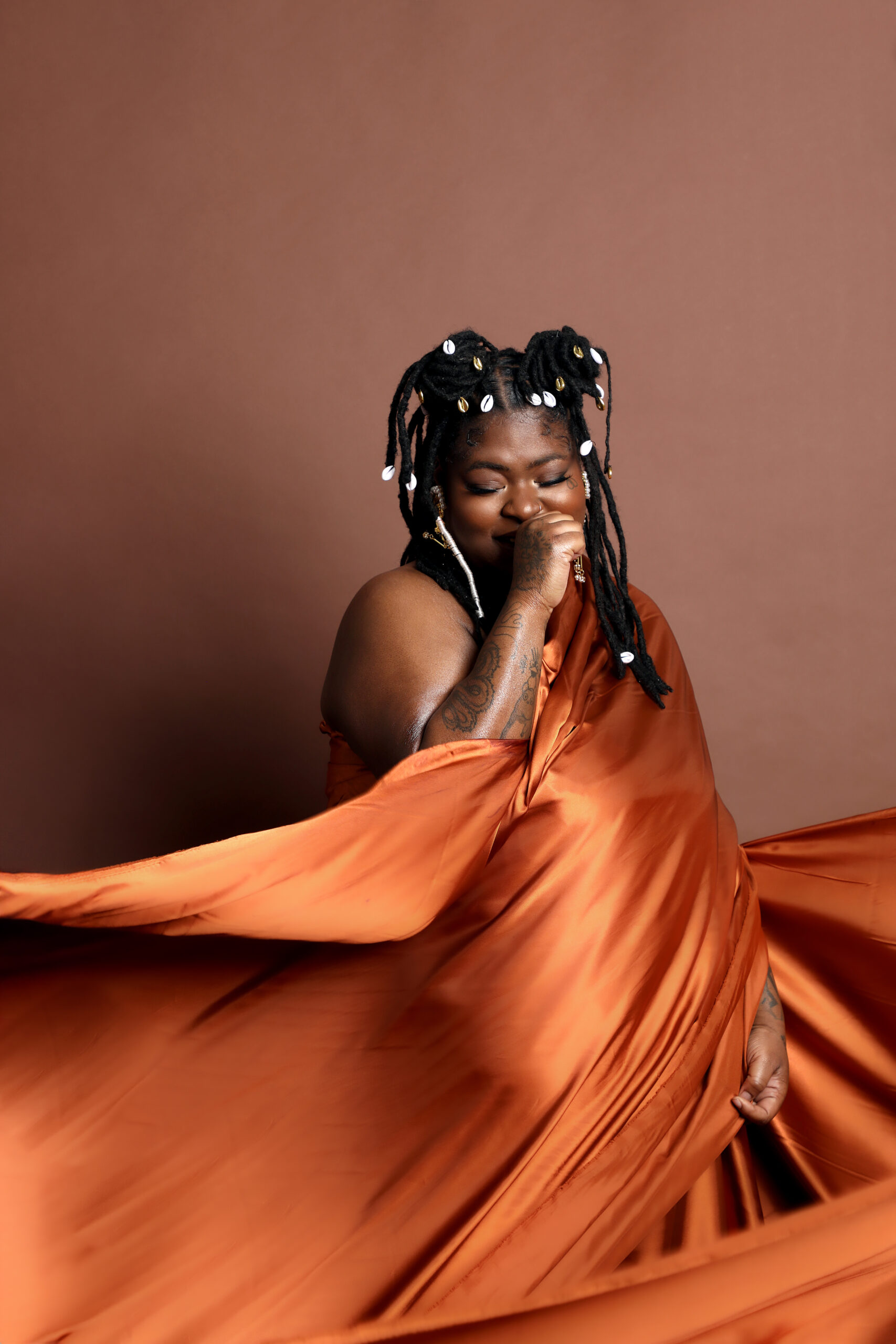 Shakira: As we’re talking about this kind of, like, archetypes of feminine and masculine, I’m thinking about a spoken word piece of yours — “I’m not a flower I’m a tree”? It feels like you might be reconciling that in some way. I’m curious, how do you feel in relation to the artist that wrote that?
Shakira: As we’re talking about this kind of, like, archetypes of feminine and masculine, I’m thinking about a spoken word piece of yours — “I’m not a flower I’m a tree”? It feels like you might be reconciling that in some way. I’m curious, how do you feel in relation to the artist that wrote that?
Chika: It’s really funny because, in recent years, everyone — all of the clinical professionals around me — have been trying to figure out: “What’s up with her? What is her thing?” And we haven’t landed firmly, but there is high suspicion that I have BPD [borderline personality disorder]. And one of the traits of that is having an “unstable sense of self.”
Before the pandemic, it feels like that person — whoever she was… I miss her so much, first of all. But there’s been a split, I think, kind of in my psyche where, back then, there was no fear. I wasn’t creating from a place of having to watch what I said. I really just was focused on what I said being clear enough so that it conveyed who I was.
I feel like it’s really weird that we love to see people heal but we hate to see people broken.
When I look at those old writings and listen to my old poetry, it’s like I feel it on such a visceral level. It was just so clean and pure and realistic and authentic to who I am.
Shakira: Right. And for BPD… Having a diagnosis is super helpful for having a common language and finding the right tools. The piece about “unstable sense of self” is so much hand-in- hand with being told what box you have to be in. Having this projection on you. Feeling like, “Okay, well, I’ve lost my sense of self because I’m only allowed to be here [in this box], but I actually want to be all of the places.”
Chika: Yeah, or having one part of yourself amplified and glorified, but when another part comes out, being told it is wrong. When they both existed simultaneously since the beginning of time. And then the internet will take one character flaw as a character indictment. And it becomes not only this one flaw — perceived flaw, whatever — it’s like, we’ll throw that away, and also everything that you’ve shown us before. We’re throwing it all away because if this exists, then these can’t possibly exist.
And so now I’m like: “Who am I?” Where was I when I was writing “Bloom?” I knew who I was. I was stating it.
And so, when you enter into a career field that is reliant on creating a persona, it’s not a good place to be for someone with my “neuro-spiciness”, as I like to call it.
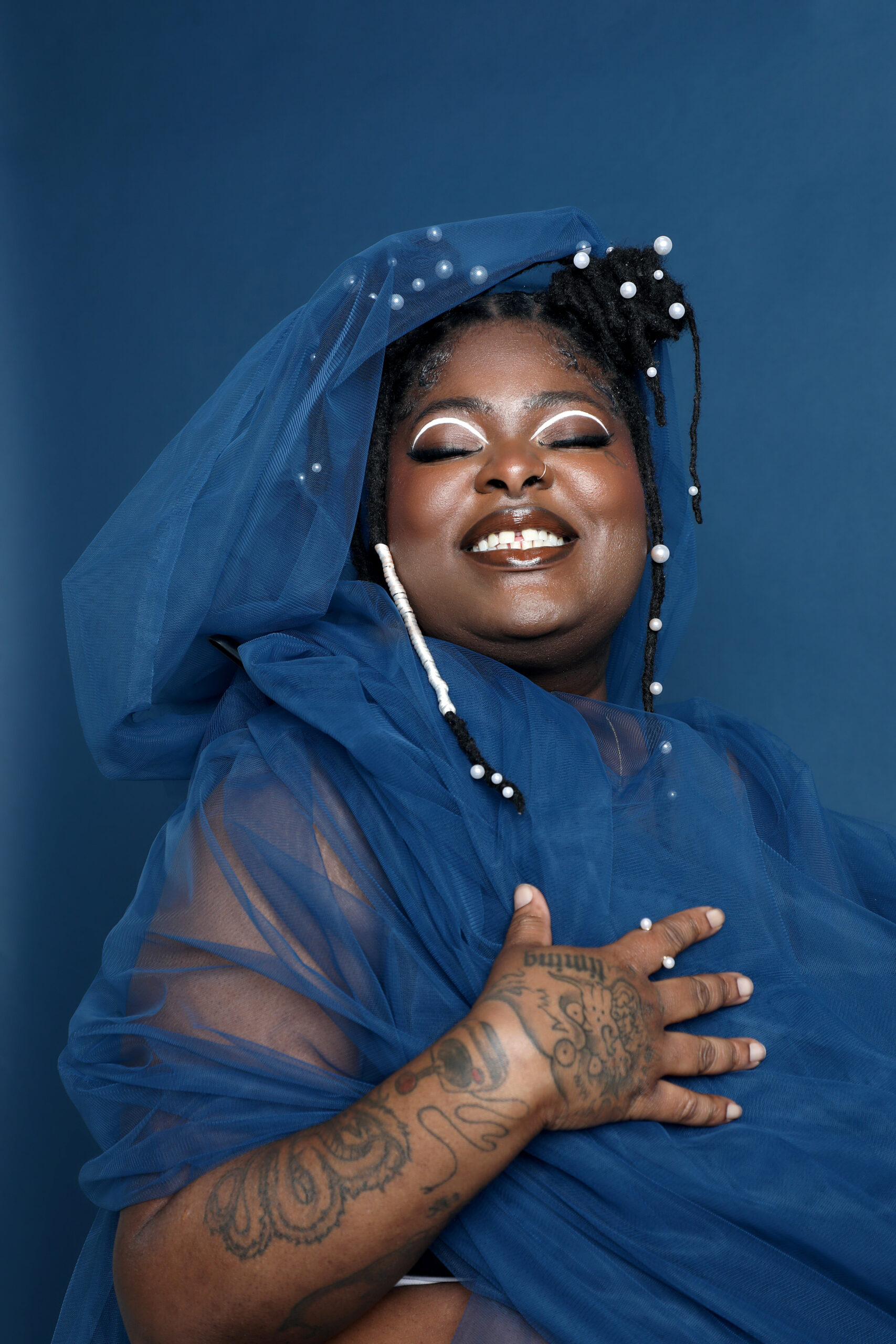 Shakira: Right. Alright. So, what does healing mean to you? We’re talking about it at the micro level, but if we go a layer out… You know, hindsight is 20-20, “forest for the trees”, and such.
Shakira: Right. Alright. So, what does healing mean to you? We’re talking about it at the micro level, but if we go a layer out… You know, hindsight is 20-20, “forest for the trees”, and such.
Chika: In terms of taking it from a microcosmic-level to macro, then I think the most important thing that people need to understand — and even myself, even people who are healing — is that healing is non-linear. And it’s something that people don’t give enough grace to when they’re talking about healing.
People think that it’s like, there’s hurt and then you progress out of the hurt. Like it’s just this steady upward line on a line graph. But that’s not how it works. Sometimes it’s hurt and you progress out of it, but then you fall a little bit lower because of whatever happened before that initial hurt that might still be lingering. It’s now a compounded issue and then you bounce out of that.
I found solace every single high and I’ve found some new piece of me that needs healing every single low.
It’s like grieving. You don’t know what day is going to look like what other day. You don’t know what thing might set you off. You don’t know what thing might make you pull you out of being in a dark space. That’s what healing is about. Sometimes you have to reopen a wound and clean it out for it to be able to heal because whatever’s under that scab is festering and you need to take care of it.
So, yeah, I feel like it’s really weird that we love to see people heal but we hate to see people broken. It makes no sense. How do you get one without the other?
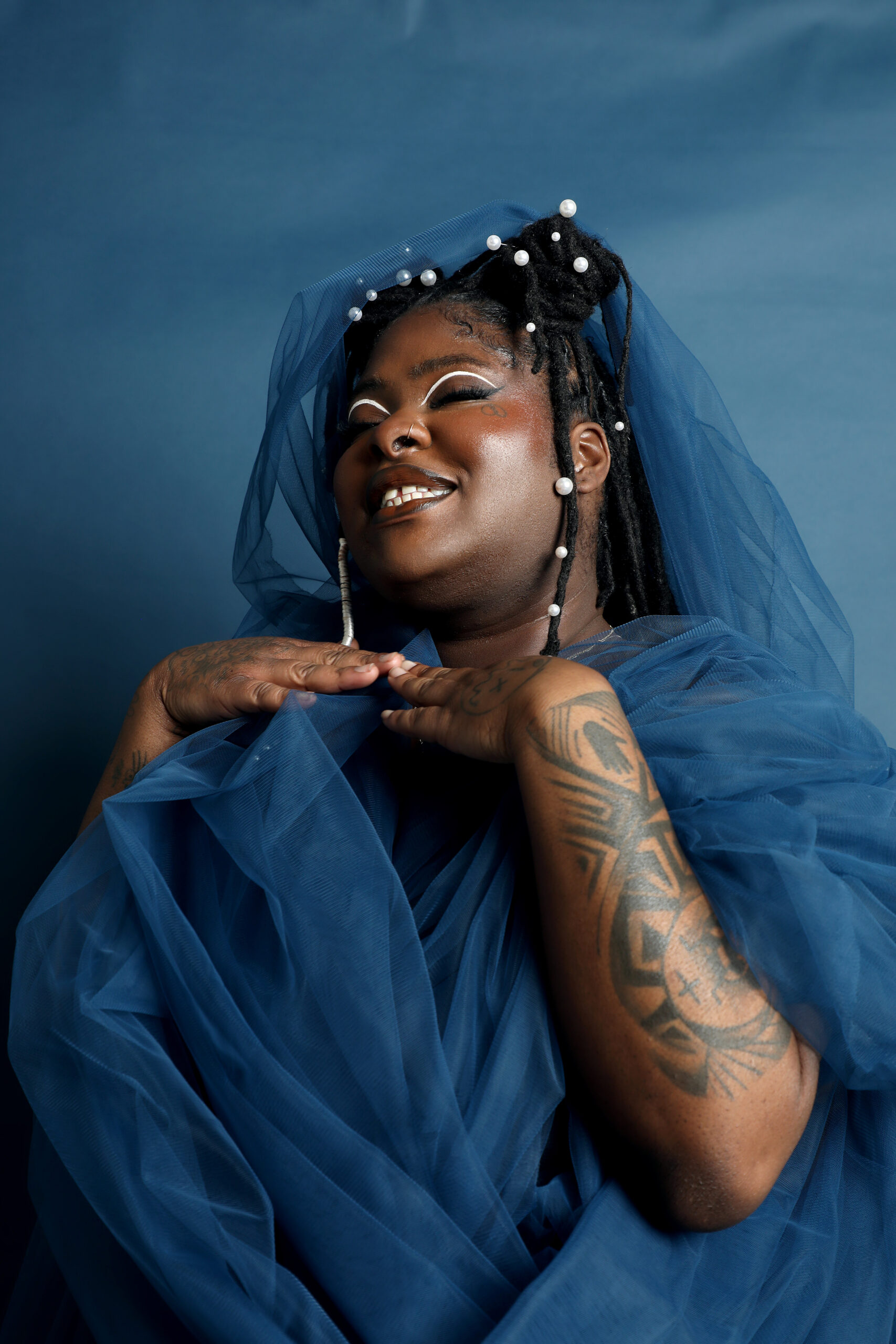 Shakira: What was the moment or series of moments that this dawned on you? Like, “Oh, what I really need to be doing is seeing this as a journey”.
Shakira: What was the moment or series of moments that this dawned on you? Like, “Oh, what I really need to be doing is seeing this as a journey”.
Chika: Having very high highs and very low lows. And also having people — having the blessing and the privilege — of people also commenting while I’m having very high highs and very low lows.
Now, anytime there’s a low and people see that it’s not good, there’s a comment about it not being authentic or “she does this every five months”… and then I start — for me, again, BPD — I start questioning myself. Like, am I an attention seeker? Are these cries for help? Do I really not feel like I want to be here? And while being in that cycle of thought, I not only don’t trust everyone else around me, I don’t trust myself. Because I’m like… I don’t know. I feel like I have good intentions, but am I manipulative? Am I hurting people around me? Should I just not reach out when I don’t feel good?
My entire life I’ve been told that I was fat, chubby, this-that-and-the-third. I’ve heard everything. I’ve heard every fucking description of myself that ain’t “a child of god.”
But I found some solace every single high and I’ve found some new piece of me that needs healing every single low. So, taking a step out of it and observing myself as a spectator — that’s what has shown me that I need to give space to do this. Because it’s only when I’ve been met with opposition or judgment that it’s stopped. The healing has stopped. Because now I’m [distracted by judgment] instead of feeling something and instead of working through something and trying to figure out who I am.
And it’s been hard for me because — sharing on social media, especially — they want you to be a brand. You are an entity that exists outside of your own humanity. But my social media was never meant to be that for me. It never was meant to be this extension. It was an avenue. It was a vehicle for me to have my career.
Shakira: I definitely notice more people reporting suicidal thoughts in post- pandemic/pandemic internet. Part of me feels like there’s a small light in internet culture that has let people see that they’re not the only one… Which just means it was probably already there, but now they’re more comfortable talking about it. That any “normalizing” is more about, like: You can have [suicidal thoughts] and also be bright another day and still have purpose in life and sometimes it’s just about surviving that moment.
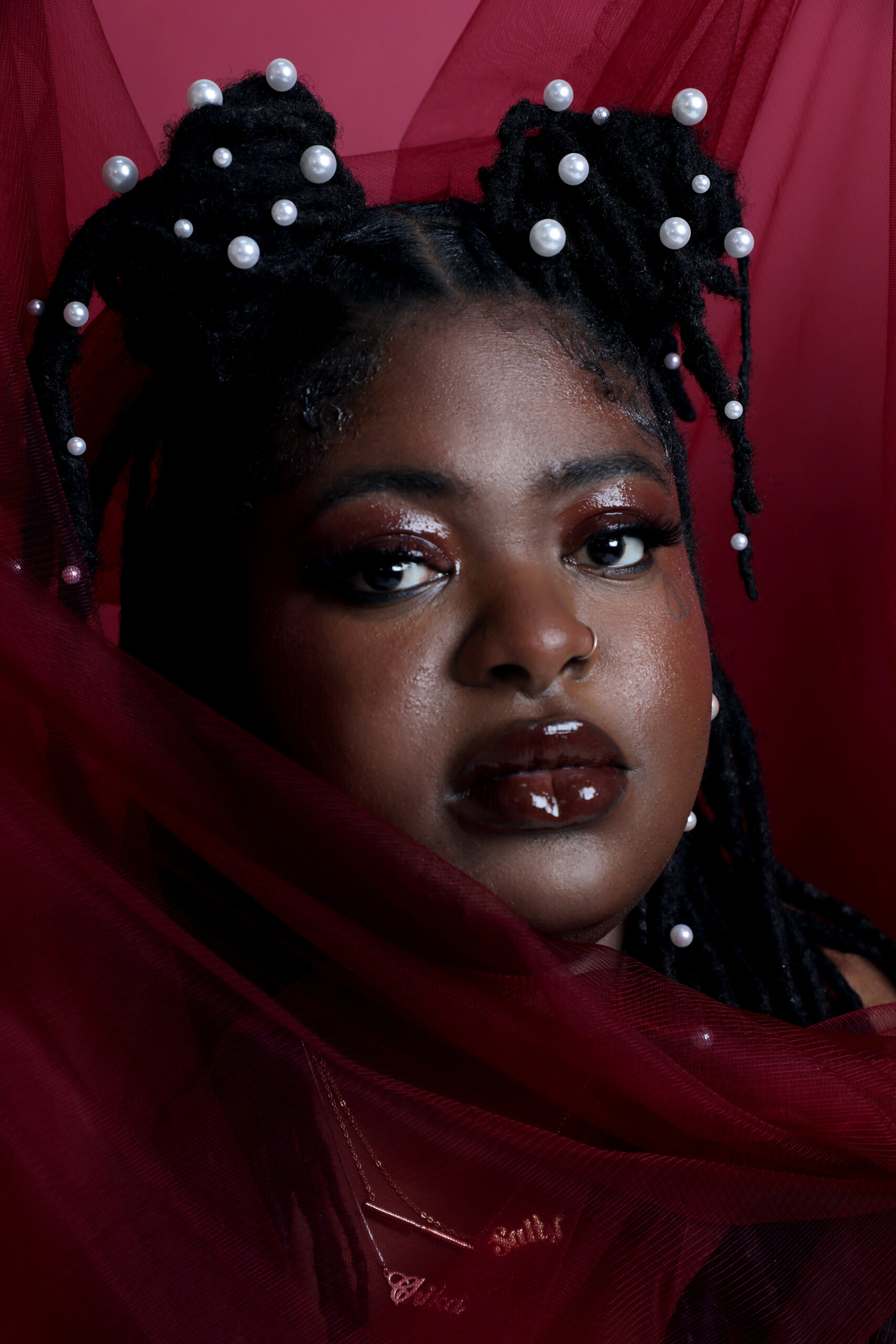 Chika: That’s the hardest fucking part. Like, trying to explain to people that these two things exist in tandem. I am not just this funny, witty, like, goofy character running around and doing dumb shit with the wigs that I don’t need and should not own. There’s also this depressive side.
Chika: That’s the hardest fucking part. Like, trying to explain to people that these two things exist in tandem. I am not just this funny, witty, like, goofy character running around and doing dumb shit with the wigs that I don’t need and should not own. There’s also this depressive side.
And sometimes that can be debilitating. It’s not one or the other. They’ve always existed at the same time.
Now, the goal is to have [the depressive side] pipe down a bit and have the goofy one be able to, you know, have her inner child moment and exist in a world where she’s not in fight-or-flight mode all the time. However, I never exited fight or flight mode, so until we get there, you have to understand that they are both here.
They wanted me to be gay Lizzo so bad.
Shakira: You’ve talked some [on social media] about disordered eating, eating disorders. Would you be open to sharing a little bit about that here?
Chika: Sure. I have a very weird relationship with the conversations about my body, conversations about bodies, [and] conversations about perception of bodies.
My entire life I’ve been told that I was fat, chubby, this-that-and-the-third. I’ve heard everything. I’ve heard every fucking description of myself that ain’t “a child of god.” So, my relationship with food was sabotaged from the jump. I wasn’t a fat kid. I look back and I was a normal pre- pubescent kid, who was literally, uh, growing?
So, I had already picked up really unhealthy habits. It wasn’t, “Incorporate movement into your day” or anything like that. It was restriction and punishment. Getting into high school, and into young adult life, I became what I would classify as bulimic. It was either over-exercising or eating and then over-exercising to compensate. Early on it was binging and… well, not even binging and purging. Just purging. It wasn’t a matter of, like, I’m restricted so much that I’m gonna eat, eat, eat, and then I have to throw up. It wasn’t like that. It was like, “Oh, I ate. Time to throw up.”
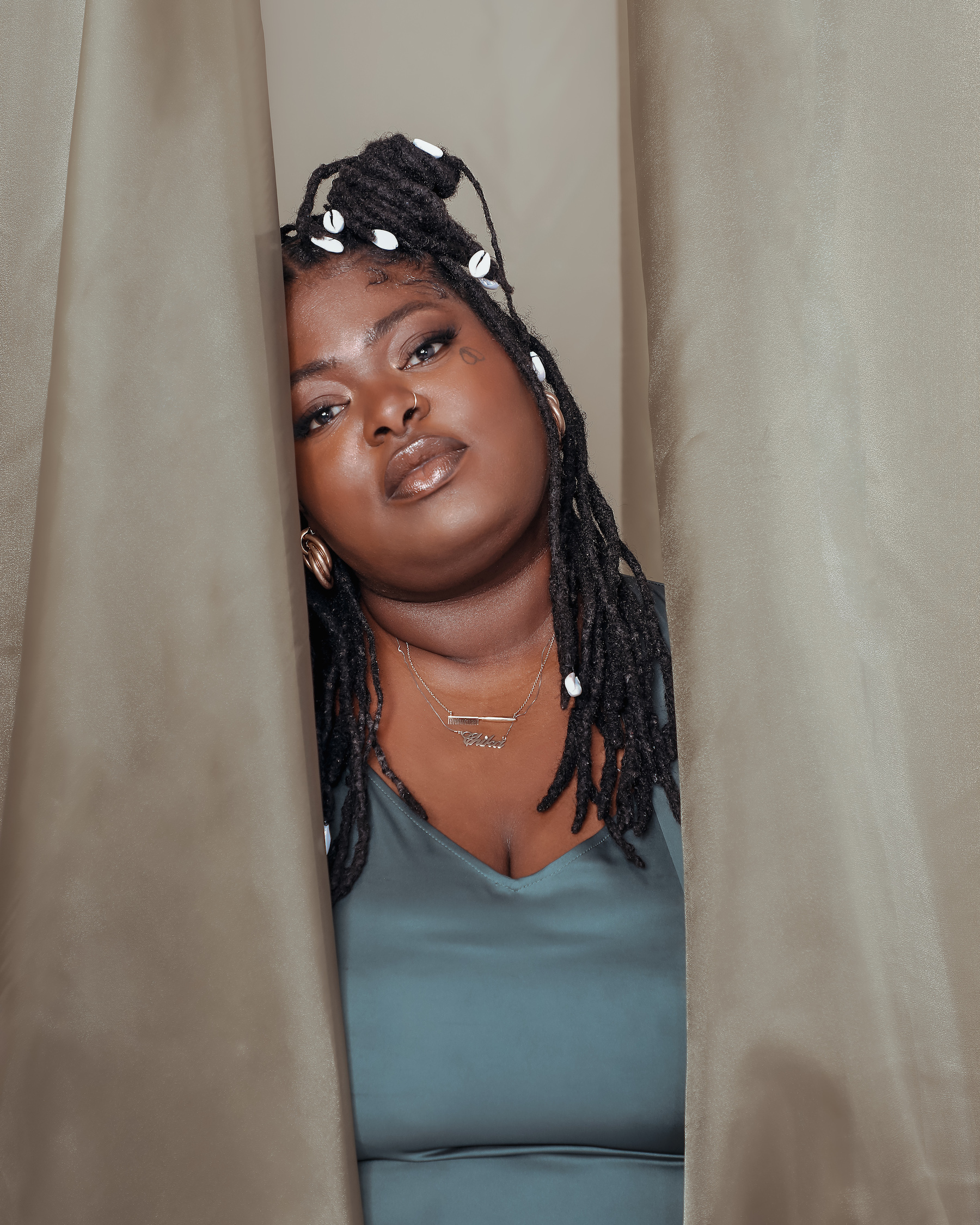 Shakira: So, you literally had food.
Shakira: So, you literally had food.
Chika: Yeah! I had food. And because it wasn’t showing outwardly on my body that I had an eating disorder, no one gave a fuck. No one was asking, “Are you okay?”
So, with the whole conversation around eating disorders, bodies and all that… Like, I’m learning about eating disorders based on other shit that I’m going through. So, now, I have to take a step back and I can’t really dive into that conversation until I begin to fix the foundations of where all that comes from. Because, for me, it doesn’t start with eating disorders. It starts with understanding myself and trauma and unlearning learned behavior.
And I clearly am in the depths of self-discovery and self-love and self-deprecation to the point that that conversation is better handled by somebody else… Which is why I never wanted to be a poster child for like, “I love my body!”
It was like, this [music] is for a person who has existed so feverishly in their own humanity that they are losing their shit, but they also see themselves as a person and fully realize what they are.
They wanted me to be gay Lizzo so bad. I swear to god. And [if] had I leaned into that, I’d probably be a lot further than I am, but it was never about showing up as a big, Black woman. Like, no bitch! This is just the body I exist in. This is just the vessel I’m in.
Shakira: And that’s fucking radical as fuck, too. But not, like, internet radical. That’s for real radical.
Chika: That’s real-life radical and we don’t like real-life radical. We hate that because it’s not a brand. It’s not something that you can box in because real-life radical… sometimes it’s contradictory to itself.
Shakira: Okay, last thing. We’ve been talking about your personal healing journey, but do you feel like there are experiences that you’ve had that are healing for [others]? Maybe your family, your ancestors, or other “little Chikas?”
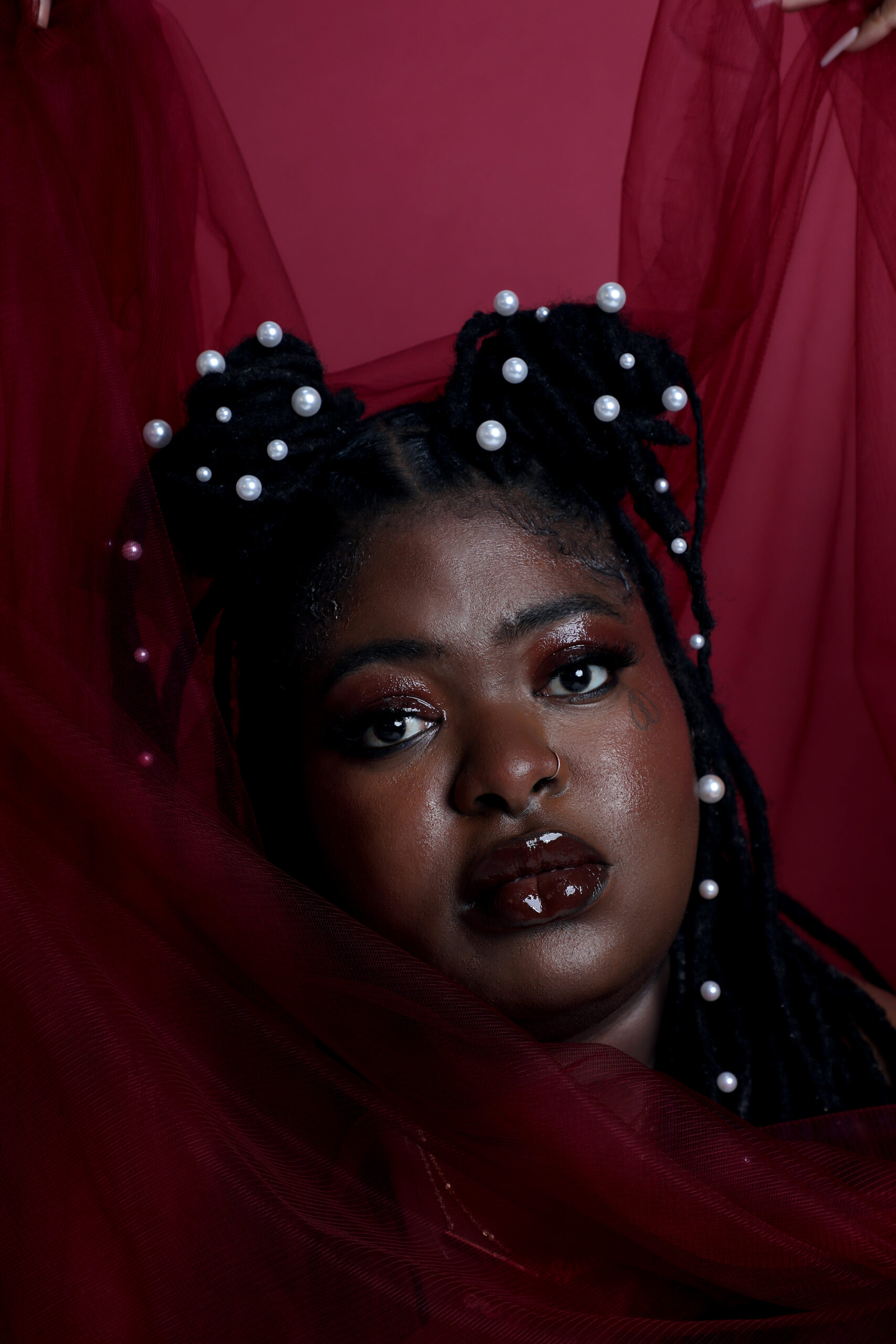 Chika: There’s a lot that goes into trying to place who I was making the music for — or, like who I do make music for.
Chika: There’s a lot that goes into trying to place who I was making the music for — or, like who I do make music for.
I knew that I was making something that universally should be understood. It would be received by those who like the genre. It wasn’t a matter of like, “Oh this is for this is for the African kids who grew up in America, this is for the queer Black girls, for the outspoken Black women.” It wasn’t anything like that.
It was like, this [music] is for a person who has existed so feverishly in their own humanity that they are losing their shit, but they also see themselves as a person and fully realize what they are. This is for all of those different parts of those people.
[In my music], I know that I am speaking to somebody. Even though I may not know who that somebody is, I know whatever I say should bring comfort and healing, and it shouldn’t land on ears that are not ready to hear it. So, that’s the intention I move from. I can never really feel a sense of like, “Oh, this is touching that. This healed that in me,” because I don’t think I’m ever trying to heal anything in me [with my music]. I just know where the pain is and I can speak to that.I’ve always said my strength is my vulnerability. At first, it’s like, “Oh my god, she’s so open and vocal about all these different things,” and then when the vulnerability is more reminiscent of something you don’t like in yourself, then it’s like, “Oh we don’t like that kind of vulnerability.” Because it’s dangerous to brands and it’s going to run people off. And if you can’t monetize your vulnerability, then it’s not a good thing.
So, the very thing I was built up to think was the thing that set me apart — being vulnerable, being open, being authentic… Now I don’t really know what the angle to approach anything from is. Like, I was always just being myself, now I don’t even feel comfortable doing that. It’s very scary.
Shakira: I mean, which is the inherent issue with — that’s an oxymoron, a marketable vulnerability… Okay, then it’s not vulnerability anymore. It’s not authentic anymore.
Chika: Exactly. Everyone has learned how to curate their image of themselves — ugh, it’s so sad really. It’s bleak, bro. Because, the way I see it, we’ve learned really well how to mimic authenticity, and that scares the fuck out of me.
If anything, let’s use my life as a little case study, and just look at people as they are and as what they’re trying to be. And if it’s trying to be good, then let’s give grace and space for that to blossom rather than going into the garden and weeding out any perceived threat that might stop the growth. You might end up cutting what was a rose vine. You don’t even know what that is yet because you haven’t allowed it to grow into anything.
Shakira: Word. I really appreciate your time today. Enjoy your shoot! I’m super excited to see what comes out of it.
Chika: Yeah, this was great. I feel like everything that needs to be said has been said. The only thing I would just like to end with is that I’m looking forward to whatever paradigm shift is happening where we can all begin to be ourselves again. That’s the last thing I wanted to say.
About the Author:
Dr. Shakira Smith is a licensed psychologist, scholar, and advocate. She’s a farm- and lust- witch, with heavy water- sign placements that influence her visionary, healing, and story works. You can learn more about her therapy approach and practice at shakirasmithphd.com

